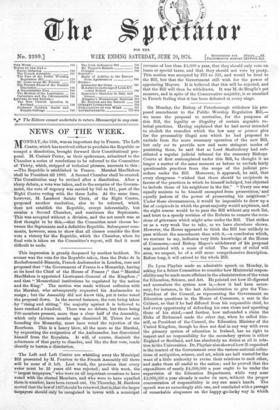On Monday, the Bishop of Peterborough withdrew his pro- posed
amendment to the Public Worship Regulation Bill,— we mean the proposal to neutralise, for the purposes of this Bill, the legality or illegality of certain arguable ru- brical practices. Having explained that he had never intended to abolish the remedies which the law may at present give for the presumably illegal acts which he had proposed to exclude from the more summary operation of the new Bill, but only not to provide new and more stringent modes of punishing them, he said that as Lord Shaftesbury had sub- stituted a regular judicial tribunal for the summary Bishops Courts at first contemplated under this Bill, he thought it no longer a matter of the same moment as before to exclude fairly questionable practices from the scope of the judicial pro- cedure under the Bill. Moreover, it appeared, he said, that every clergyman "wished that there should be excipienda in favour of the practices in which he himself indulged, but objected to include those of his neighbour in the list." "Every one was equally anxious to be himself exempted from prosecution, and equally jealous of the power of prosecuting his neighbour." Under these circumstances, it would be impossible to draw up a list of excipienda in which the great majority would acquiesce, and the right course would be to pass the Bill without any such list, and trust to a speedy revision of the Rubrics to remove the occa- sions of grievance which might arise under the Bill. That strikes us as a very weak line to take, as we have elsewhere shown. However, the House appeared to think the Bill less unlikely to pass without the amendment than with it,—a conclusion which, we venture to say, indicates very little knowledge of the House of Commons,—and Bishop Magee's withdrawal of his proposal was received with a sense of relief. The sense of relief will soon, we suspect, be of a still more comprehensive description. Before long, it will extend to the whole Bill.


































